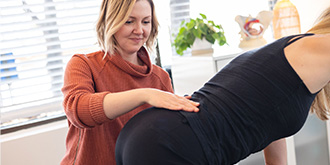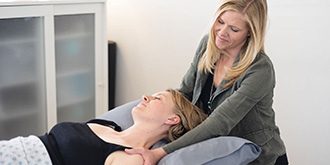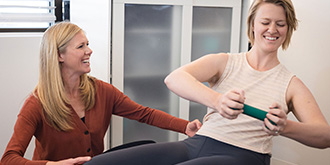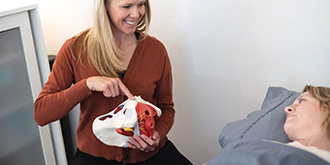Services

Prenatal and Post Partum Care

TMJ

Orthopedics

Pelvic Pain, Incontinence, Prolapse, Urinary and Bowel Dysfunction
Prenatal and Post Partum Care
If you are planning to become pregnant, are pregnant, or are post-partum, seeing a Doctor of Physical Therapy (DPT) who specializes in pelvic health can help make your pregnancy more comfortable and improve physical recovery post-partum. Pregnancy and the associated hormonal changes cause shifts in the musculoskeletal system (muscles, bones, and connective tissue) that can cause pain, poor fetal positioning, difficult labor, and delayed recovery. Our DPT’s have specific training and years of experience helping moms with these problems to heal.
On your first visit, your DPT will spend significant time getting to know you. They want to understand your concerns, goals, and lifestyle. Your DPT will perform a complete examination to determine areas of muscular imbalance, postural deficits, and faulty movement patterns. This often includes hands on muscle testing, measurement of joint motion, observation of movements, and sometimes, an internal examination of the pelvic floor region. We encourage mothers to hold, nurse/ bottle feed, wear and carry their babies so that your DPT can observe real life activities and provide suggestions to make those easier, less painful, and to prevent future problems.
We understand first hand the physical demands that children place on a mother’s body. Our DPTs have felt how hard it is to maintain good body mechanics while carrying a car seat, placing a baby in a crib, or grabbing a toddler about to run across the street. We understand how it feels to have an abdominal muscle separation (diastasis recti) and how traditional exercises often don’t work. We have experienced how sex can be painful and how scary the first bowel movement after delivery can be. This is a judgement free zone where no topic is taboo. We know that every mother faces different challenges and has different goals. As a result, examination and treatment is customized to fit each individual.
Our DPTs will provide extensive education to help you understand the anatomical changes that have occurred to your body, how and why those changes might be causing problems, and how to treat those problems and prevent them in the future.
Here is a list of pregnancy related conditions commonly treated by our DPTs:
- Back Pain
- Neck Pain
- Shoulder Pain
- Hip Pain
- Rib Pain and difficulty breathing
- Sciatica
- Tailbone Pain (Coccydynia)
- SI (Sacroiliac) Joint Pain and instability
- Groin and Pubic Bone Pain (Symphysis Pubis Dysfunction- SPD)
- Pain with walking, hiking, exercise, and sleep
- Postpartum body concerns
- Abdominal separation (Diastasis Recti Abdominis)
- Return to exercise postpartum
- Exercising while pregnant
- C-section scar pain or dissatisfaction in appearance
- Carpal Tunnel (wrist and hand pain and numbness)
- Painful sex (dyspareunia)
- Pelvic floor muscle tightness
- Pelvic floor muscle weakness
- Urinary incontinence (urine leakage)
- Fecal incontinence (bowel leakage)
- Pelvic organ prolapse
- Episiotomy or tearing during delivery causing pain or scar tissue
- Difficulty with breastfeeding/ nursing positioning
- Sleep positioning to address insomnia
Pelvic Pain, Incontinence, Prolapse, Urinary and Bowel Dysfunction
Our Doctor’s of Physical Therapy have extensive training to assess and treat problems such as:
- Painful sex (dyspareunia) and/ or painful tampon use
- Pelvic floor muscle tightness
- Pelvic floor muscle weakness
- Urinary incontinence
- Fecal incontinence and smearing
- Pelvic organ prolapse (cystocele, rectocele, uterine prolapse)
- Scar tissue pain or other concerns
- Education and recommendations regarding pessary use (does not perform fittings)
- Pudendal Neuralgia (numbness, nerve irritation in the pelvic region)
- Proctalgia Fugax (rectal pain)
- Coccydynia (painful tailbone, pain with sitting)
- Chronic constipation, slow transit, and outlet obstruction
- Pain associated with endometriosis
- Pre and post operative pelvic surgery consults
- Painful and frequent urination (Interstitial Cystitis)
- Overactive bladder
- Pain caused by Vulvodynia, Vaginismus, Vulvar Vestibulitis, Levator Ani Syndrome
Treatment is performed in a private, spacious, and comfortable office. You will see the same DPT at every visit, for the entirety of the session. On your first visit, your DPT will spend extensive time getting to know you. They want to understand your concerns, goals, and lifestyle. Your DPT will perform a complete examination to determine areas of muscular imbalance, postural deficits, and faulty movement patterns. This often includes hands on muscle testing, measurement of joint motion, observation of movements, and often, an internal examination of the pelvic floor region. Your DPT will look at the body as a whole versus treating one area or symptom. Any examination and treatment methods will be explained in terms you can understand and will be performed based on your DPT’s recommendations and your comfort level.

Orthopedics
In addition to pelvic health concerns, our DPTs treat traditional orthopedic conditions as well. Most pelvic health concerns coincide with orthopedic problems. For example, urinary incontinence is often caused not only by pelvic floor muscle weakness but also by abdominal weakness, poor posture, improper breathing strategies and faulty movement patterns. On the flip side, lower back and hip pain is often caused by pelvic floor muscle dysfunction. In short, our DPTs will evaluate your entire body and your whole person when addressing your concerns.
Here is a list of orthopedic conditions our DPTs commonly treat:
- Back pain
- Hip pain
- Neck pain
- Shoulder pain
- Knee pain
- Sciatica
- Disc pathology, stenosis, arthritis
- Foot and ankle pain
- Achilles tendonitis
- Plantar fasciitis
- Osteoarthritis
- Osteoporosis and Osteopenia
- Abdominal pain and weakness
- Chronic headaches (tension, cervicogenic headaches)
TMJ
The temporomandibular joint (TMJ) is one of the most stressed and used joints in the body. The masseter muscle (used for talking, chewing and clenching) is one of the strongest muscles in the body and is frequently overused. Stress and chronic tension often lead to knots and tension in the muscles surrounding the TMJ, which lead to problems like popping, clicking, and locking in the joint. TMJ dysfunction (TMD) is also commonly associated with chronic headaches and neck pain. Our DPTs have advanced training and mentorship in the area of TMD, headaches and neck pain. They can help to determine the source of pain and dysfunction, treat that impairment, and prevent future problems from occurring.


5600 South Quebec St. Suite 156B
Greenwood Village, CO 80111
information@popperpt.com
